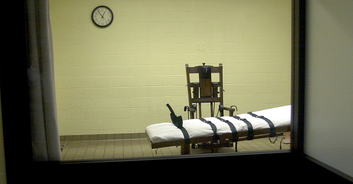In 1979, Albert Flick was sentenced to three decades in prison for the murder of his wife, Sandra Flick. The attack came three weeks after she had served him divorced papers. After requesting that he stop by to collect his belongings, he stabbed her 14 times with a jackknife, as her daughter watched on, the Lewiston Sun Journal reported.
Flick was released 21 years later in 2000 due to good behavior, according to WCSH. However, just seven years later, Flick was back behind bars after he was charged with punching the woman he was dating and stabbing her with a fork, the New York Times reported.
Per the Press Herald, in 2010, Flick then assaulted a different woman in his Portland apartment. The victim informed the authorities that Flick had placed her in a headlock, hit her repeatedly with the butt-end of a knife, and then chased her with a screwdriver after she managed to wriggle free. When police arrived at the scene, they found Flick attempting to hang himself from a fire escape.
But Flick's reign of terror didn't end there:Despite the fact he was getting older (Flick would have been 68 years old in 2010), his violent tendencies were not going away. Nonetheless, the judge only sentenced him to just shy of four years in prison.
Per the Portland Press Herald, Maine Superior Court Justice Robert E. Crowley said: "At some point Mr. Flick is going to age out of his capacity to engage in this conduct, and incarcerating him beyond the time that he ages out doesn’t seem to me to make good sense." In short, the belief was that Flick would be too frail upon his release to commit more violent crimes.
The judge wasn't strictly wrong to believe this, either. According to a study compiled by the U.S. Sentencing Commission found that, in 2017, just 13.4% of offenders who were 65 or older when they were released from prison were later arrested again in the eight-year period following their release. This is a drastic difference from the 68% of those under the age of 21.

However, just eight years after he was deemed "too old" to kill again, Flick stabbed homeless mother Kimberly Dobbie to death outside of a laundromat in Lewiston, Maine, as her 11-year-old twin sons watched.
On Wednesday, at the age of 77, he was convicted of murder, and will most likely spend the rest of his life in prison. And despite the fact the minimum sentence is 25 years, prosecutors plan to request that Flick is placed behind bars for life, the Sun Journal reports.
Elsie Clement, who watched as her mom was attacked and subsequently murdered by Flick in 1979, told a local NBC outlet that the judge who set Flick free now has to answer to Dobbie's children:
"I would like to just see [everyone involved] in a line and stand there and tell [Dobbie’s] boys, explain to them how this man was on the streets and how it’s OK.
"How the law makes it alright for their mom to now be gone and for them to have to witness it."





